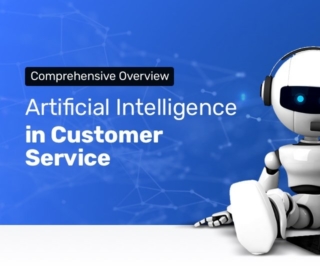
IDC estimated the size of overall AI-related spending in the banking industry in their Worldwide Semiannual Cognitive Artificial Intelligence Systems Spending Guide report at around $3.3 billion in 2018. It follows that AI would find its way into the banking world. We covered the current state of AI banking applications in the US and India in our previous reports, and in this report, we’re going to focus on where AI can be leveraged for customer service applications in banking. This report covers vendors offering software across three functions:
- Customer Service
- Internal Customer Service
- Case Management
What Business Leaders in Banking Should Know
Two of the companies in this report offer their software to multiple industries, namely Acuvate and Kore.ai. These companies offer to build chatbots for clients, specifically to allow their employees to troubleshoot IT issues without requiring the time of IT specialists at the company.
This application is reminiscent of another AI solution to help enterprise bank employees: AI document search.
Personetics also offers a chatbot solution, although there’s is customer-facing. Their clients’ customers can interact with the chatbot on their company websites or messaging platforms like Facebook Messenger. In doing so, the chatbot can purportedly answer customer questions such as “What is my bank balance” and recommend products to them.
That said, business leaders in banking need to be aware that chatbot implementations are usually only good for rudimentary tasks. In addition chatbot support for languages other than English might not be available yet.
In terms of customer service applications, chatbots seem to be the “low-hanging-fruit” AI application in banking. However, business leaders in banking need to be aware that chatbot implementations are usually only good for rudimentary tasks. In addition chatbot support for languages other than English might still be a little stodgy.
The most unique of the companies listed in this report is ThreatMetrix, which offers a solution for case management, including fraud detection software. Case and claims management, or any form of customer analytics, are usually larger endeavors than integrating a chatbot into a web portal. Banks wishing to automate these processes will need to understand the prerequisites for AI applications in this space, such as certain volumes and types of data and talent requirements.
That said, not all of these companies meet our standard for vetting AI vendors on whether or not they are actually offering AI solutions or whether they are being deceptive about it.
Kore.ai’s Director Solutions Architect focuses on chatbots, and he does hold a Master’s in Comptuer Science. It is unclear on his LinkedIn page when he earned that degree, however, and so we are unsure if he has any formal training in natural language processing. The company’s CTO also holds a Master’s in Computer Science that he earned in 2007, which is a good sign. In addition, he was at IBM for nine years, where he worked on solutions specifically for the banking industry. This bodes well for the company because their CTO has both computer science and subject-matter expertise.
Acuvate, on the other hand, does not employ any data scientists according to LinkedIn, and their AI Practice Head holds a Bachelor’s of Technology in Electronics and Communications Engineering. Although Acuvate could very well provide a worthwhile service to its customers, we find it relatively unlikely that the company is actually leveraging machine learning because their head of AI does not have the kind of academic and/or AI business experience credentials that one almost always needs in order to create machine learning solutions. Again, however, this does not reflect on their ability to provide an internal customer service solution for IT issues.
The same can be said of Personetics, who lists a few data scientists and data analysts on its LinkedIn profile that hold Bachelor’s degrees in computer science and various kinds of engineering. They seem to employ one data scientist with a Master’s in Industrial Engineering and Business Analytics. The company also does not have AI talent in its C-suite, which is another sign that the company may not actually be leveraging AI like they say they are, at least not the kind of natural language processing that one might expect of a company claiming to do AI in 2018.
That said, however, Personetics is backed by Sequoia and Lightspeed Venture Partners, which actually lends significant credence to their claims. Prominent venture capitalist firms located in major tech cities are generally not going to offer money to companies they don’t research and question extensively; they’ve likely confirmed at least in some way that Personetics is offering machine learning, else they wouldn’t back them. That said, these companies backed Personetics toward the beginning of the century when machine learning was just starting to garner some buzz. It’s possible they funded Personetics for that reason, although again, it bodes well for Personetics’ solution because they did.
ThreatMetrix employs several data scientists with PhDs and Master’s degrees in computer science. Thus, we believe they have a high likelihood of actually offering a machine learning solution to banks looking to manage their cases and detect fraud. They’ve also raised over $90 million in venture capital
Customer Service
Personetics
Personetics is a London-based company founded in 2010. The company offers a chatbot called Assist, which they claim can help banks offer personalized self-service banking services using NLP and cognitive computing.
Personetics claims they developed Assist specifically for the financial services sector and the natural language processing in the software is tuned towards banking and finance jargon. The Assist can purportedly integrate into a bank’s website, mobile app and messaging platform like Facebook. Banking customers can then interact with the conversational interface in natural language and ask the chatbot questions or for product recommendations. Personetics claims their chatbot can identify patterns in information, such as the customer’s most recent transaction data or the kind of questions asked by the user. The chatbot also seems to use predictive analytics to “guess” each user’s reasons for the next likely interaction. Customers can enact actions such as making transactions or getting product information through the conversational interface.
Personetics claims to have helped Royal Bank of Canada develop NOMI Find & Save, a personal banking chatbot on the bank’s mobile app. The chatbot can scour through customer transaction data and generate insights indicating how customers might increase savings. According to Personetics, this resulted in Royal Bank of Canada’s mobile app increasing by 20%within the first five months of deployment.
We were unable to find any mention of enterprise-level companies on Personetics’ website nor in any of their press releases, but they are backed by Carmel Ventures, Sequoia and Lightspeed Venture Partners.
We were unable to find evidence of C-level executives with AI experience on the company’s team although they claim that COO and Co-Founder David Govrin has expertise in machine learning and analytics algorithms. We could not verify this on Govrin’s LinkedIn page.
Internal Customer Service
Kore.ai
Kore.ai is an Orlando, Florida-based company with 216 employees. The company offers a namesake platform, which it claims can help banks resolve IT issues faster using a conversational interface.
Kore.ai claims users can integrate their Kore.ai platform into their internal web portals. The platform comes built-in with a software bot that has already been calibrated for the most common enterprise ITSM, ticket management, and IT knowledge base systems, such as Servicenow, Salesforce Desk, Freshdesk, and SAP Hybris. Then, Kore.ai platform can be used to deploy these prebuilt chatbots as is or with additional custom capabilities that require a longer integration period of 4-6 weeks. Implementing these additional capabilities will require companies to train the chatbots with more data from sources such as social media feeds or customer interaction data.
The system then provides employees at banks with a chatbot interface integrated with their existing enterprise IT services management software. Employees can type in search queries in the chatbot interface to automatically resolve IT issues such as password reset, application management, install software updates or gain insights on asset management.
Below is a short 4-minute video demonstrating how the Kore.ai IT helpdesk software works:
Kore.ai does not make available any case studies reporting success with their software.
We were unable to find any mention of enterprise-level companies on Kore.ai’s website nor in any of their press releases, but they were featured as one of the companies in IDC’s Innovators in Conversational AI Software Platforms report.
PrasannaKumar Arikala CTO at Kore.ai. He holds an MS in Computer Science from Sri Venkateswara University, Previously, Arikala served as Chief Architect at Kony Labs.
Acuvate
Acuvate offers a software which it claims can help banks manage internal IT issues by creating an automated IT helpdesk.
Acuvate claims users can integrate their chatbot into existing enterprise help desk management services, such as Servicenow, Freshdesk, JIRA, Sharepoint and Skype for Business. Acuvate claims their IT helpdesk solution uses machine learning to “remember” the most optimal resolutions provided for different customer search queries. This might help the software provide more accurate results over time. The software could help banks build IT helpdesk services, such as a knowledge base that would enable employees to receive contextual responses for questions. The system then provides links to internal web portals or documents within the chatbot interface that can help speed up the resolution of basic IT helpdesk questions.
Below is a short 1-minute video demonstrating how users can resolve troubleshooting issues by using the chatbot:
Although there seems to be evidence of Acuvate having worked with enterprise level players, the company does not make available any case studies reporting success with their software in the banking sector.
Acuvate also lists Coca-Cola, Microsoft, the Bank of India, Reckitt Benckiser, New Zealand Foreign Affairs and Trade, Unilever, Shell as some of their past clients.
We were unable to find any C-level executives with AI experience on the company’s team.
Case Management
ThreatMetrix
ThreatMetrix is a San Jose California-based company with 272 employees. The company offers a software which it claims can help banks and financial institutions with case management using machine learning.
ThreatMetrix claims users can integrate their case management software using APIs into existing business processes. Banks and finance companies with large volumes of fraud cases traditionally use human analysts to manually review these cases. ThreatMetrix claims their Case Management solution can help banks automatically monitor and isolates transactions that might require additional review. Security analysts at banks can use the software to review only the highest priority fraud cases and let the software handle more low priority cases.
ThreatMetrix claims the case management solution uses their Digital Identity Network machine learning tool to comb through the data and get real-time actionable insights for fraud events. The system then provides analysts with a list of cases that need human review. Analysts can use the ThreatMetrix Decision Management Portal to investigate these events and accept, reject, or ignore the recommendations suggested by the software for each fraud event.
Below is a short 1-minute video demonstrating how ThreatMetrix Digital Identity Network works:
ThreatMetrix claims to have helped Kabbage prevent fraudulent loan applicants from using stolen credentials. Kabbage needed to reduce the cost and time taken in their fraud detection process as their customer volume continued to grow. Kabbage deployed the ThreatMetrix solution in two parts. The ThreatMetrix Digital Identity Network machine learning tool was first used to identify “good” and “bad” device IDs and IP addresses.
The software then sent the security analysts a list of the applications corresponding to “bad” devices or IP addresses for review. Once confirmed by the human security analyst, the software removes the fraudulent applications from their pool. ThreatMetrix claims their software also allowed Kabbage to analyze the digital footprints of small business to identify any suspicious loan applications. According to ThreatMetrix , this resulted in Kabbage’s analysts being able to prioritize legitimate applications and reduce the time spent (manual review rates) on fraudulent cases. Other benefits claimed by ThreatMetrix include revenue savings from reducing fraud losses and higher levels of customer satisfaction. We could find no measurable metrics for these claims in their case study, however.
ThreatMetrix also lists Netflix, VISA, lyft, Airbnb and Lloyds Banking Group as some of their past clients.
Jun Zhang is Chief data Scientist at ThreatMetrix. He holds a PhD in Computer Science from Iowa State University and a PhD in Signal and Information Processing from the University of Science and Technology, China. Prior to ThreatMetrix, he worked as a Senior Analytics Scientist at Netflix and as a senior scientist at Fico.
Header Image Credit: Finance Blvd






